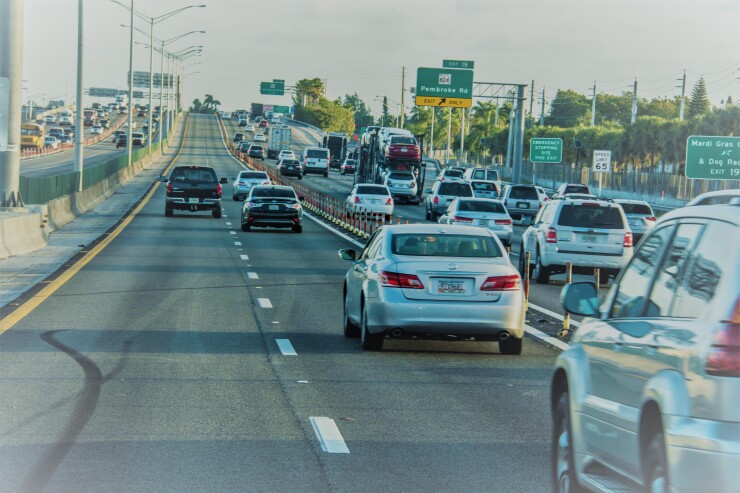A conduit issuer that Florida created as an alternative to public-private partnerships is readying its first appearance in the market.
The Florida Department of Transportation Financing Corp. will sell $170.1 million of fixed rate, tax-exempt bonds as early as the week of Aug. 13, according to Division of Bond Finance Director Ben Watkins.

The state’s underlying fiscal credit strength underpins the upcoming sale, according to Alan Schankel, managing director at Janney Montgomery Scott.
“I think demand will be very strong for this credit because it is a new credit from a very strong high-grade state, which mitigates appropriation risk,” Schankel said. “The underlying revenue stream is relatively diverse and debt service coverage is projected to be very strong.”
The division will issue a notice on Thomson Municipal Market Monitor 18 hours before taking bids on the competitive deal, Watkins said, adding that the exact sale date will depend on market conditions.
The bonds will be the first of three tranches financing a $500 million project that will convert two existing lanes on Interstates 95 and 595 in Broward County into express lanes. The I-95 portion will be tolled, although toll revenues will not be pledged to the bonds.
Debt service payments will be subject to annual appropriation by the Legislature.
The bonds are rated AA-plus by Fitch Ratings and S&P Global Ratings and Aa1 by Moody's Investors Service. All have stable outlooks.
Florida’s general obligation bonds are rated triple-A by all three agencies thanks to a June
Maximum annual debt service coverage on the bonds is estimated at 300 times, according to an online
The deal is structured with maturities between 2019 and 2033 and a 10-year call date with level annual debt service payments.
The bonds are secured by a service contract between the corporation and the FDOT, which will pay debt service from the state transportation trust fund.
Watkins, who is chief executive officer and president of the board overseeing the corporation, said an appropriation-backed structure was selected for financing projects because it is stronger – and rated more highly – than pledging tolls.
Under the state’s constitution, tax revenue can’t be pledged to secure debt without voter approval in a statewide referendum. That has been done in some state financing programs, while others use contract payments with annual appropriations to pay debt service.
“The service contract is coterminous with the term of the debt and the annual payment is equal to the principal and interest on the bonds,” he said. “It’s a pretty straightforward mechanical structure. We’ve created a captive conduit issuer and we’re simply leveraging the revenue stream.”
Donna Biggins, an attorney with the Division of Bond Finance, is the secretary and treasurer of the corporation. Greenberg Traurig PA is bond counsel.
Watkins said he took the rare step for Florida of preparing the online investor presentation to introduce the financing corporation as a new credit. It was circulated with the preliminary official statement and posted on BondLink, the division’s disclosure platform.
“We only do [an investor presentation] when we feel we need to communicate specifics to analysts and the investor community,” he said. “It’s all part of a broader effort to have communications directly with analysts and investors to enhance our reputation in the credit market and enhance the liquidity of our name” for the sale of bonds in the secondary market.
The Seaport Investment Program created in 2013 was the last new credit introduced by the state.
The Legislature created the FDOT Financing Corp. in 2016 as an alternative financing mechanism for transportation projects that would otherwise be implemented as a P3 using a design, build, finance, maintain and operate structure.
Watkins said he objects to some P3s because the private partner takes little or no ridership risk and he has found that some P3s done by the state in the past weren’t financed in a cost-effective manner.
“There are places where [P3s] can add value and there are places where they don’t,” he said. “We were using them in places where I’d say not so much.”
The FDOT has three agreements with private partners to advance construction of the I-595 Corridor Improvement Project, build the Port of Miami Tunnel Project, and construct the I-4 Ultimate Project through Orlando.

The combined capital costs as well as operations and maintenance expenses of the three P3s total $7.2 billion over the next 38 years, according to the 2017 state debt affordability report.
Watkins said he was not consulted when the three P3s were developed. He said he discovered one that used private financing that was not favorable to the state.
FDOT signed a 35-year concession agreement with ACS Infrastructure Development Inc., in March 2009 to design, build, finance, operate, and maintain the I-595 Express Lanes project. It was the state’s first highway project to use an availability payment scheme.
The 9.5-mile project added three tolled, reversible express lanes near three major corridors - I-595, I-95, and the Sawgrass Expressway - to relieve severe congestion and provide for future capacity in south Florida. It opened in March 2014.
Watkins said after examining the I-595 funding structure, he refinanced the bank debt using taxable bonds and a private placement to lower the project’s cost.
The FDOT Financing Corp., he said, will give the state an opportunity to determine whether to use public or private financing on future projects.
“You can use the good old fashioned tax-exempt bond market to get the best financing in the world,” he said. “We’re always looking for ways to make it cheaper for the state and this is the strategy devised to do that.”
The financing corporation has been structured to be a strong credit backed by stable resources, Watkins said, “to take advantage of the state’s triple-A ratings and achieve the lowest cost of borrowing.”
The FDOT is required to include all debt service payments due under the service contract in its annual legislative budget request. The agency has covenanted to continually monitor funds in the trust fund and to defer payments on other contractual obligations to the extent necessary to ensure funds are available for service contract payments.
Revenues in the trust fund totaled $6.92 billion in fiscal 2018. The fund is largely composed of Federal Aid Highway Program revenues and state motor and aviation fuel taxes, motor vehicle fees, and documentary stamp taxes collected on real estate sales.
Some $4.07 billion or 59% of the trust fund revenue was collected by the state and $2.85 billion or 41% came from federal revenues.
Net trust fund revenues available for service contract payments have ranged from $3 billion to $4.3 billion over the past 10 years, and are projected to increase to $5.2 billion over the next 10 years.

The upcoming bond issue will finance a portion of Phase 3 of the 95 Express Lanes network, a 29-mile-long project designed to improve mobility in congested Broward County.
It is anticipated that the FDOT Financing Corp. will issue two more tranches of bonds to fund the Broward express-lane project. After this year, $188 million is expected to be sold in the third quarter of 2019 and $121 million will be sold in 2020. After all three tranches are issued the maximum annual debt service coverage is projected to be 100 times.
The FDOT is considering using the corporation to finance a $315 million project in central Florida, although it and all future financings must be approved by the Legislature first.
In Broward, FDOT has contracted with Archer Western Construction and The de Moya Group Inc., a joint venture that will design and build the I-95/I-595 project, according to FDOT spokesman Ed Seifert. The project will be managed and maintained by FDOT, he said.
Design and permitting has begun and construction is expected to start in the summer of 2019, with completion December of 2024.
Previously, 21 miles of 95 Express lanes were built in Miami-Dade and Broward counties. Portions of the projects use dynamic, congestion based tolls that are collected electronically with SunPass transponders.
Toll prices will fluctuate based on traffic demand in the express lanes, which can only be used by two-axle vehicles and buses.
Express lanes are also being used in Jacksonville, Orlando and Tampa, and the FDOT is conducting a master plan study of the I-95 corridor in Palm Beach County.





